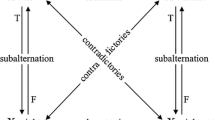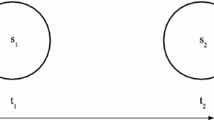Abstract
This paper discusses two conceptions of the Filipino expression bahala na. The first implies a fatalistic attitude, while the second implies an open-minded attitude toward an uncertain future. We explore how these two conceptions may be used to frame and address the familiar philosophical puzzle about the compatibility of divine omniscience and human free will.
Access this chapter
Tax calculation will be finalised at checkout
Purchases are for personal use only
Similar content being viewed by others
Notes
- 1.
The terms Visaya, Tagalog, Ilokano, and Bicolano refer to ethnolinguistic groups in the Visayas, Tagalog, Ilocos, and Bicol regions, respectively.
- 2.
- 3.
The first (published) inquiry into the implications of bahala na to the philosophical problem of fatalism was undertaken by Gripaldo (2005) (Matienzo, 2015). Gripaldo’s work is notable as it outlined the various philosophical positions implied by this Filipino expression and evaluates the “positive” and “negative” features of bahala na. This present work is different from Gripaldo’s since its main focus is to elucidate the implications of the passive and active attitudes implied by bahala na to the concept of divine omniscience.
- 4.
There is a whole literature about the metaphysics of time implied by the indefinite nature of future tense sentences. However, this is already beyond the scope of this present paper. For a discussion of this literature, see (Garrett, 2017, ch. 7).
References
Bostrom, L. C. (1968). Filipino Bahala Na and American Fatalism. Silliman Journal, 15(3), 399–413.
Bulatao, J. (1965). Split-level Christianity. Philippines Sociological Review, 13(2), 119–121.
Cahn, S. M. (2009). Fatalism. In J. Kim, E. Sosa, & G. Rosenkrantz (Eds.), A companion to metaphysics (2nd ed., pp. 264–266). Basil Blackwell.
Casiño, T. C. (2013). Mission in the context of Filipino Folk Spirituality: Bahala Na as a Case in Point. In W. Ma & K. R. Ross (Eds.), Mission spirituality and authentic discipleship (pp. 157–171). Regnum Books International.
Cotnoir, A. J. (2018). Theism and dialetheism. Australasian Journal of Philosophy, 96(3), 592–609.
de Mesa, J. M. (1979). And God said, “Bahala na!”: The theme of providence in the Lowland Filipino context. Publishers’ Printing Press.
Frankfurt, H. (1969). Alternate possibilities and moral responsibility. The Journal of Philosophy, 66(23), 829–839.
Garrett, B. (2017). What is this thing called Metaphysics? (3rd ed.). Routledge.
Grimm, P. (1983). Some neglected problems of omniscience. American Philosophical Quarterly, 20(3), 265–276.
Gripaldo, R. M. (2005). Bahala Na [Come what may]: A Philosophical Analysis. In R. M. Gripaldo (Ed.), Filipino cultural traits: Claro R. Ceniza Lectures (pp. 203–220). Council for Research in Values and Philosophy.
Hong, Y. (2020). Powerlessness and a social imaginary in the Philippines: A case study on Bahala Na. The Ashbury Journal, 75(1), 127–150.
Jocano, F. L. (1981). Folk Christianity: A preliminary study of conversion and patterning of Christian experience in the Philippines. Trinity Research Institute.
Lagmay, A. V. (1978). Bahala Na! Philippine Journal of Psychology, 26(1), 31–36.
Matienzo, R. A. (2015). Revisiting the philosophy of Bahala Na Folk Spirituality. Filocracia, 2(2), 86–105.
Pike, N. (1965). Divine omniscience and voluntary action. Philosophical Review, 74, 27–46.
Rice, H. (2018). Fatalism. The Stanford Encyclopedia of Philosophy (Winter 2018 Edition) (E. N. Zalta, Ed.). https://plato.stanford.edu/archives/win2018/entries/fatalism/
Robb, D. (2020). Moral responsibility and the principle of alternative possibilities. The Stanford encyclopedia of Philosophy (Fall 2020 Edition) (E. N. Zalta, Ed.). https://plato.stanford.edu/archives/fall2020/entries/alternative-possibilities/
Author information
Authors and Affiliations
Corresponding author
Editor information
Editors and Affiliations
Rights and permissions
Copyright information
© 2023 The Author(s), under exclusive license to Springer Nature Singapore Pte Ltd.
About this chapter
Cite this chapter
Joaquin, J.J. (2023). Bahala Na: Fatalism or an Open Future?. In: Hongladarom, S., Joaquin, J.J., Hoffman, F.J. (eds) Philosophies of Appropriated Religions. Springer, Singapore. https://doi.org/10.1007/978-981-99-5191-8_7
Download citation
DOI: https://doi.org/10.1007/978-981-99-5191-8_7
Published:
Publisher Name: Springer, Singapore
Print ISBN: 978-981-99-5190-1
Online ISBN: 978-981-99-5191-8
eBook Packages: Religion and PhilosophyPhilosophy and Religion (R0)




